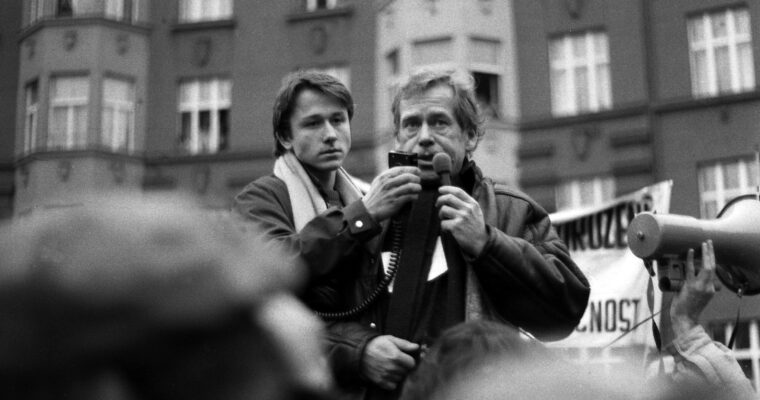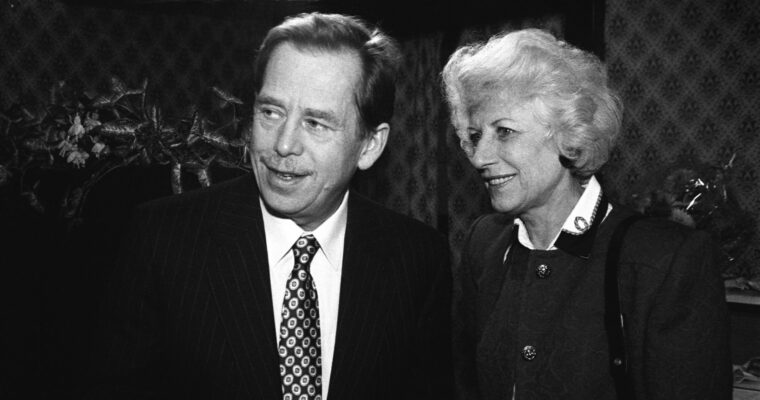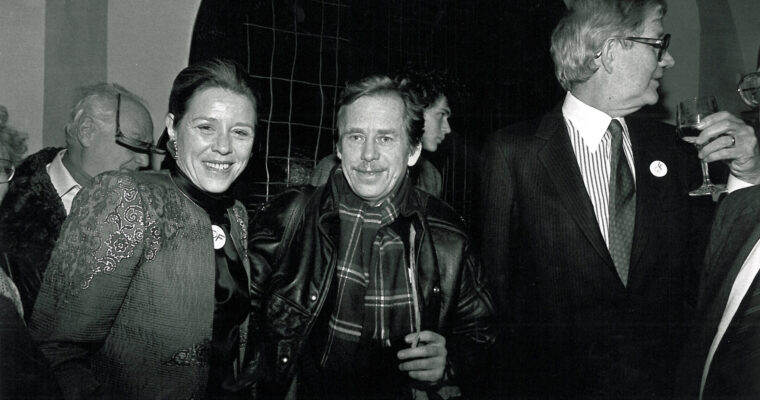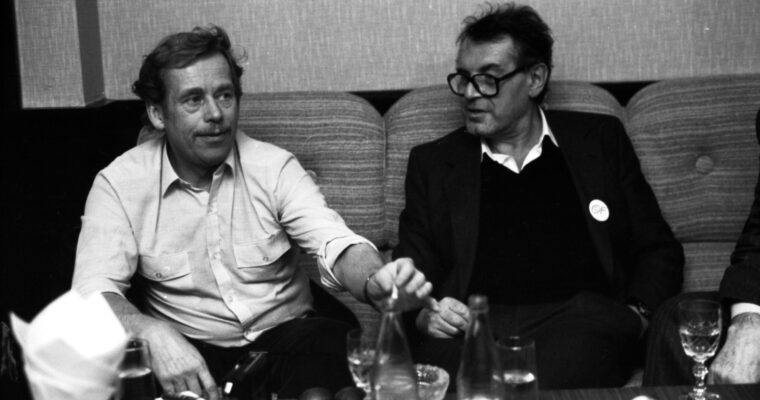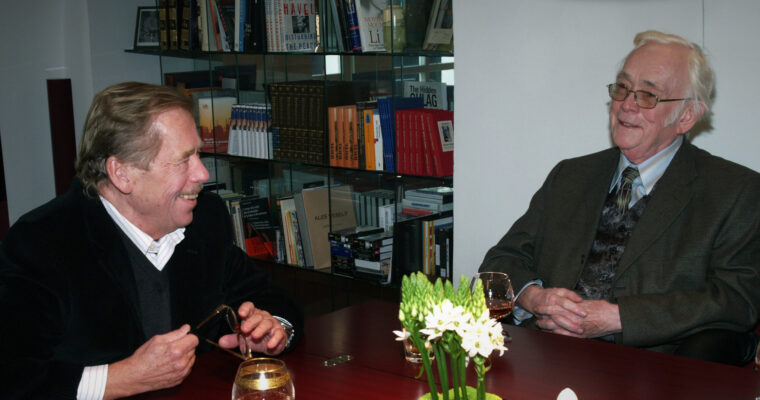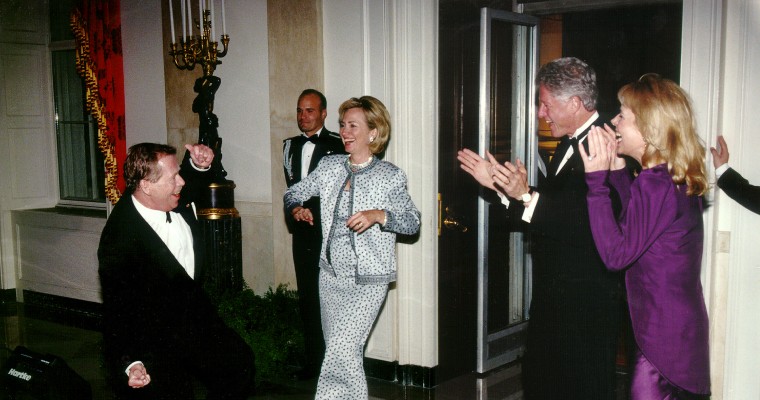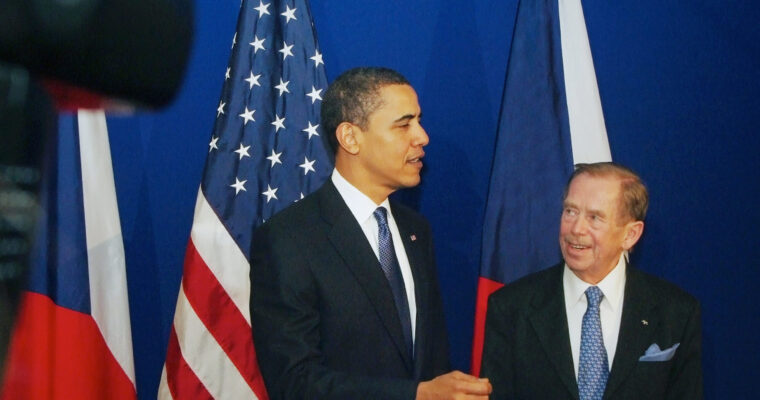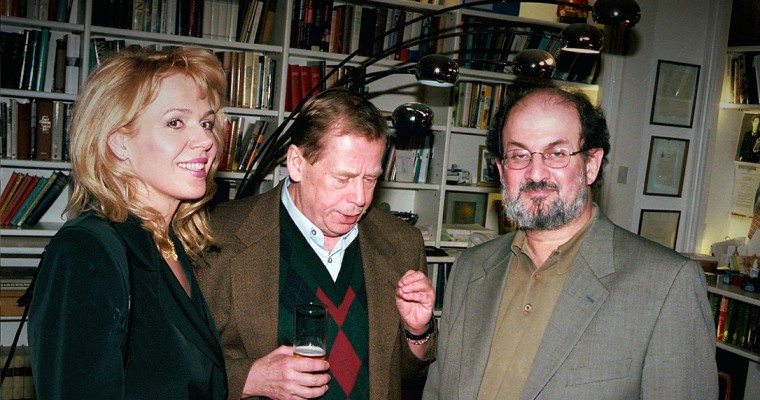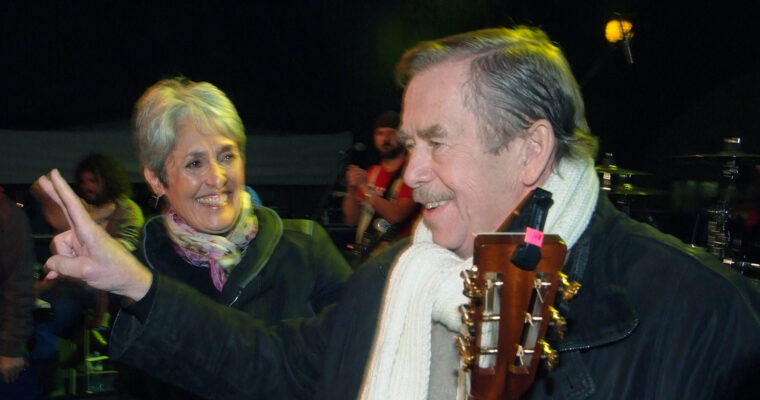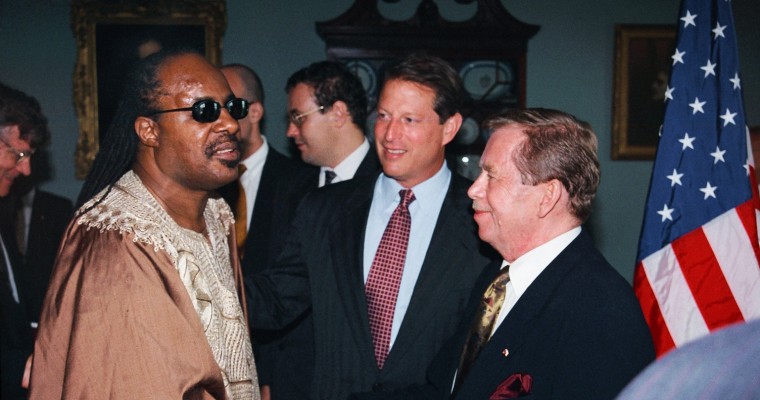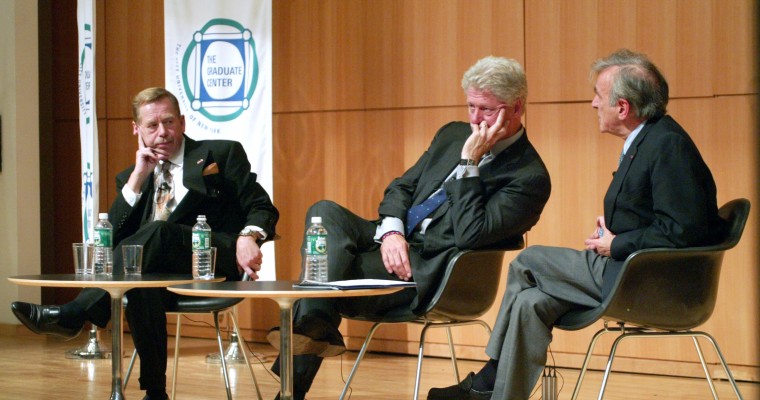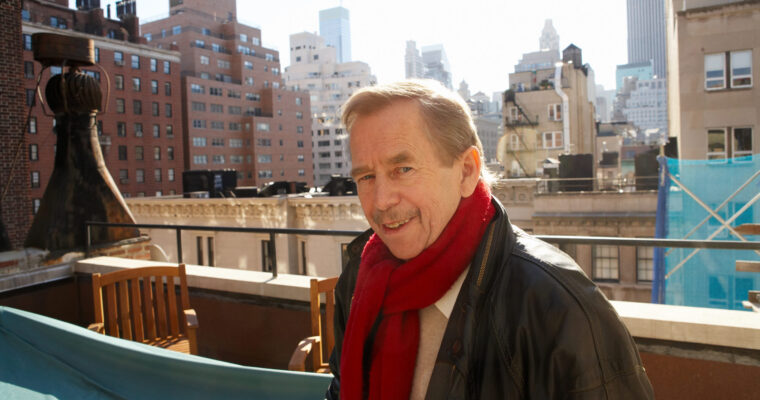Encounters with America
The Life:
Three Encounters with America
March 30, 2015 / By Martin Palous / President, VHLF Board of Directors
Born in 1936 in a “bourgeois family” – a detail, of course, that greatly disadvantaged him forever in a society building socialism – Havel was a teenager in the Stalinist era, with all of its revolutionary zealotry and persecution in the name of a “radiant future.” In his late teens and early twenties he lived through the process of “de-Stalinization”, the gradual “thaw” that started after the dictator’s death.
The 1960s was a period of Havel’s formation as an artist and a thinker. He quickly became recognized as one of the distinct emerging voices signalizing that the Communist system imposed on Czechs and Slovaks could not wipe out their creative spirit; their need to raise questions and think independently; and their hopes for a more open and less ideologically constrained future in spite of the Cold War stalemate in Europe.
It was the atmosphere of the “Golden Sixties” in which Havel formulated his basic thoughts about politics and society and discovered his most characteristic weapon to fight totalitarianism: the power of theater as a unique tool of social self-awakening. Havel saw theater as a space where all of the individuals involved in the production of a drama – from its author, director and actors through stagehands and other technical personnel as well as the audience – can be freed for at least a couple of hours from the otherwise omnipresent ruling ideology and “purified” from its debilitating impact. At the “On the Balustrade” theater, where he found his artistic “home”, Havel observed a remarkable social phenomenon: that a group of people brought together in one place at the same time can be transformed into a living organism; a body of people who have something in common that enables them to overcome their differences and reach new insights, with the hidden potential to unite them again and enable them to act in concert around a common cause.
In May of 1968, when the Prague Spring – a process of reforms launched by the Czechoslovak Communist Party to “endow socialism with human face” – was in full swing, Vaclav Havel visited the United States for the first time. He traveled to New York to see his play Memorandum at the famous “Public Theater” and spent a few weeks in the city. During this visit he caught the spirit of contemporary American “counterculture” and returned to Prague full of exciting experiences including the sight of artists and “progressive” intellectuals protesting against the Vietnam War, organizing magnificent, colorful rallies in Central Park, and being passionately engaged in all sorts of activities against the US government’s policies. As a playwright – someone who was well aware of strong performative aspects of political life in a free society – he was amazed by the carnival of freedom he observed in New York and sympathized strongly and unequivocally with the rebellious side of the divided American society.
The contacts Havel established during this trip laid the foundations for his future network of personal relationships with a number of eminent figures from the American cultural world. These were the people who stood by his side in the decades to come and raised their voices in protest against the politically motivated persecutions and incarcerations he suffered.
The Soviet-led invasion of Czechoslovakia that began at dawn of August 21, 1968 not only terminated the short-lived “Prague Spring”; it also opened an entirely new chapter in the contemporary history of Czechoslovakia. Within a year the process of “normalization” was under way and Havel was finding himself in an entirely new situation. Until then he had been a respected figure on the official Czechoslovak cultural scene; now, he was shunned from the public sphere and his books were banned, condemning him to write texts only for himself and a close circle of colleagues and friends in similar situations.
At first, Havel retreated into his own small world inhabited mostly by the hommes de lettres similarly punished for their participation in the 1968 revolt. In April 1975, however, he turned his sights on one extraordinary reader: He wrote an open letter to Dr. Gustav Husak, the Secretary General of the Communist Party and, soon, the President of the Republic. In retrospect, this was the moment Havel declared his individual war on the normalized totalitarian regime.
The core of Havel’s argument in this letter was as follows: Dr. Husak and his Party leadership had been quite successful in meeting the basic goals of “normalization”: reinstalling a true “socialist order” in a society dangerously weakened by the failed counter-revolutionary attempt; forcing people to renounce the subversive ideas they still seemed to believe in; and getting their explicit consent for the Soviet occupation, now presented as “fraternal assistance”. They had managed, with minimal violence, to “convince” the overwhelming majority of Czechoslovak citizens to distance themselves from the “Ideals of January” to which they had sworn their allegiance just a year ago and accept the new realities. But because, in order to achieve these goals, they had to enthrone collective “lies” as a leading social “norm”, the “normalizers”, Havel argued, would inevitably fail at the end of the day. Their strategy, aimed exclusively at keeping the status quo and themselves in power, negated the very concept of truth – for Havel, a fundamental guide in human life and key organizing principle of human society. He concluded with a prognosis:
“…life may be subjected to a prolonged and thorough process of violation, enfeeblement, and anesthesia. Yet, in the end, it cannot be permanently halted. Albeit quietly, covertly, and slowly, it nevertheless goes on. Though it be estranged from itself a thousand times, it always manages in some way to recuperate; however violently ravished, it always survives, in the end, the power which ravished it.”
To most people in 1975, Havel sounded like a lonely prophetic voice speaking in the desert. His letter, however, circulated quickly and was read at large, copied and distributed among friends and then friends of friends. It certainly didn’t convince its recipient to change his mind, but it became an appeal for a moral awakening of the paralyzed Czechoslovak society and made at least some people contemplate what they could do to resist the constant pressure, bullying and blackmail of the communist regime and stop living a lie.
Less than two years after Havel sent his letter, Charter 77 was created: “a loose, informal and open association of people of various shades of opinion, faiths and professions, united by the will to strive individually and collectively for the respecting of civic and human rights in our own country and throughout the world”. Havel was one of its first spokespersons. Although the “parallel polis” founded by the declaration of Charter 77 was very small – the number of its active inhabitants was never bigger than between one and two thousand – and despite the fact that the human rights dialogue with the government that Charter 77 had been calling for never took place, the movement marked an important milestone in a Czechoslovakia stricken by the totalitarian plague: an independent public space emerged for free thinking, free exchange of information, and free creativity of all kinds. Havel was not longer limited to communicating with his old fellows from the “Golden Sixties”; he could develop his remarkable talent to pointing to and describing the relevant social and political problems of his times within an open group of free-spirited individuals. Havel quickly assumed the role of a human rights activist defending the unjustly prosecuted; a public intellectual taking stand on all kinds of “hot” current issues; an essayist and pamphleteer; a philosopher of the Socratic mold; and, of course a playwright working on a play powerful enough to transform the atomized Czechoslovak society into a real national community aware of its aspirations.
In Charter 77 one can also find the beginning of another important dimension in Havel’s personal relationship with America. In its legal reasoning, the movement cited the International Covenants of Human Rights recently ratified by the Czechoslovak Government as well as the Final Act of the Helsinki Conference on Security and Cooperation in Europe. The “Helsinki Process,“ launched to decrease the tensions between East and West and „to secure peaceful relations between the states with different social and political systems,“ as the official diplomatic language put it, offered a possibility to open new, unexplored channels of international communication. Most important, the “third basket” of the Helsinki Accords contained the human rights provisions and presupposed a sincere and constructive dialogue about them between the parties. The US Government was the first to understand that the very nature of human rights dialogue, which became a key element on the agenda of the Helsinki follow-up diplomatic conferences, implied a third party that could not be left out if the whole process were to be really effective and substantively improve the political climate in the divided European continent – a party composed of independent human rights activists, groups like Charter 77, which started to emerge one after the other in the region under Soviet domination.
This issue quickly became one of the hottest and the most explosive issues on the agenda of the East-West negotiations. Soviet and other Eastern European diplomats argued repeatedly at the Helsinki follow-up conferences that communications between the Western governments and the individuals perceived by the Soviet bloc governments as “state enemies” and “subversive elements” were in violation of the agreed principle of “non-intervention in domestic affairs”. They tried again and again to suppress as much as possible, what started to be called the “human dimension” of the Helsinki Process, but in vain. The Western countries – with the United States leading by example – were determined not to yield.
The dissidents, Havel among them, couldn’t travel abroad to make their case in international forums, but they became regular visitors to the American Embassy in Prague. They were invited to lead political dialogues with their hosts and to communicate with the Ambassador’s official and unofficial visitors. They established important human contacts over time and even personal friendships. When Vaclav Havel said at the end of his Washington speech that Americans should understand the way of thinking he represented, it was not just an unsubstantiated desire or an empty diplomatic phrase. It was a result of Havel’s empirical observations tested over the years. It was his plain and simple conviction that personal, face to face communication between human beings is the starting point for any political process; that was here, in the “human dimension” of international politics introduced by the Helsinki process, where the real beginning of a new chapter in US-Czechoslovak relations lay.
At the same time, however, Havel was well aware of the difference between being a dissident and being a head of state. On the one hand, he tried to base his message in Washington in February 1990 on his personal experiences, but on the other hand, he realized that the mission he was on now was his third and most important personal encounter with America – a very different one from the previous two. As the representative of the state, he had to take into consideration all aspects of this relationship – especially its asymmetry – and the lessons of the past, including the political tragedies that befell Czech and Slovak society during the “short” 20th century in 1938, 1948 and again1968.
What should Czechoslovakia ask for from the United States then, at the beginning of a new era, drawing on the knowledge gained from its experience with totalitarianism? US support for and assistance in Czechoslovakia’s reintegration into the free world and its institutions; a security guarantee from the strongest democratic power in the world that “small” democracies would not be blackmailed or threatened in the future by bigger powers playing hardball in the realm of global politics and thinking exclusively in terms of “zones of influence”; mutually beneficial and open communications in all matters of common interest including economic cooperation, cultural exchange and education; cooperation in the realm of human rights, where post-communist countries, thanks to their history, have specific “know how” in the ways of civic, non-violent resistance to totalitarian forms of government and possible strategies for opening from below the path to a genuine democratic transition.

